Eco-Friendly Materials for Sustainable Modular Kitchens are transforming the world of interior design, offering a harmonious blend of environmental consciousness and stylish functionality. Join us as we delve into the realm of these innovative materials, exploring their sustainability benefits, design principles, and the future of eco-friendly kitchens.
Eco-Friendly Materials
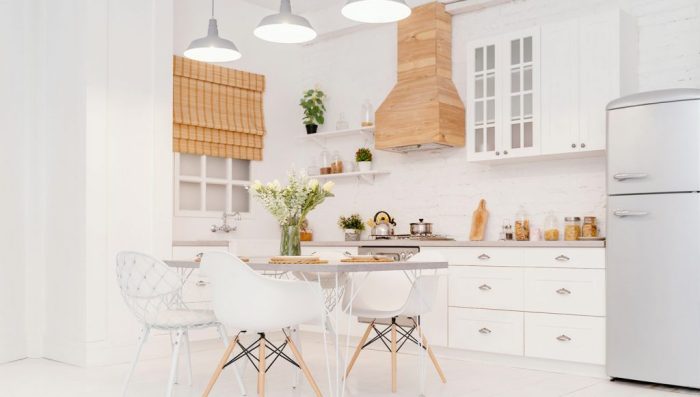
Modular kitchens, with their adaptability and space-saving designs, have become increasingly popular in modern homes. However, incorporating eco-friendly materials into their construction is essential to reduce environmental impact and promote sustainability. This article explores a comprehensive range of eco-friendly materials suitable for modular kitchens, highlighting their sustainability benefits and environmental impact.
By opting for sustainable materials, homeowners can contribute to a greener future while creating a stylish and functional kitchen space. These materials not only reduce waste and conserve natural resources but also enhance indoor air quality and promote a healthier living environment.
Wood
- Reclaimed Wood:Salvaged from old structures or discarded furniture, reclaimed wood reduces waste and adds character to kitchens. It retains its natural beauty and durability, offering a unique and eco-conscious option.
- FSC-Certified Wood:Wood certified by the Forest Stewardship Council (FSC) ensures responsible forestry practices, promoting sustainable forest management and protecting biodiversity.
- Bamboo:A rapidly renewable resource, bamboo is durable, moisture-resistant, and has a low carbon footprint. Its natural grain patterns add an elegant touch to kitchen designs.
Countertops
- Recycled Glass:Countertops made from recycled glass are durable, non-porous, and come in a variety of colors and textures. They divert waste from landfills and reduce energy consumption during production.
- Paperstone:A composite material made from recycled paper and resin, Paperstone is lightweight, durable, and resistant to heat and moisture. It offers a unique and sustainable alternative to traditional countertops.
- Quartz:A natural mineral combined with resins, quartz countertops are non-porous, stain-resistant, and easy to clean. They are a durable and eco-friendly option for kitchen surfaces.
Cabinets
- Low-VOC Finishes:Volatile organic compounds (VOCs) can release harmful chemicals into the air. Low-VOC finishes minimize emissions, improving indoor air quality and reducing environmental impact.
- Water-Based Paints:Water-based paints are low in VOCs and release fewer pollutants compared to oil-based paints. They are an environmentally friendly choice for cabinet finishes.
- Recycled Metals:Cabinets made from recycled metals, such as aluminum or steel, reduce waste and conserve natural resources. They are durable, corrosion-resistant, and offer a modern aesthetic.
Flooring
- Cork:A natural and renewable resource, cork is moisture-resistant, sound-absorbing, and provides a comfortable underfoot experience. It is a sustainable and durable option for kitchen flooring.
- Bamboo Flooring:Similar to bamboo countertops, bamboo flooring is durable, moisture-resistant, and has a low carbon footprint. It adds a natural and eco-conscious touch to kitchens.
- Recycled Rubber:Made from recycled tires, recycled rubber flooring is durable, slip-resistant, and reduces waste. It is a sustainable and practical choice for kitchens.
Sustainable Design Principles
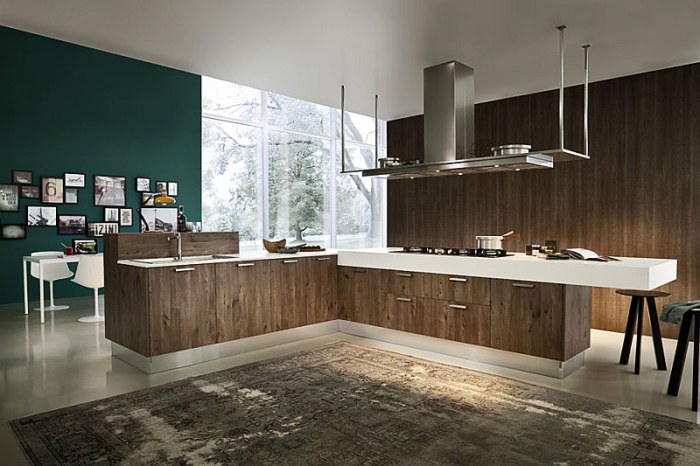
Sustainable design principles provide a framework for creating modular kitchens that minimize environmental impact and promote resource efficiency. By incorporating these principles, designers can create kitchens that are not only aesthetically pleasing but also responsible and sustainable.
Key principles of sustainable design include:
- Resource efficiency:Using materials and resources efficiently to minimize waste and environmental impact.
- Environmental responsibility:Choosing materials and processes that minimize pollution and protect ecosystems.
- Durability:Designing kitchens to last longer, reducing the need for replacements and waste.
li> Recyclability:Using materials that can be recycled or reused at the end of their lifespan.
Incorporating sustainable design principles into modular kitchens can involve practical tips and examples such as:
- Using sustainable materials:Choosing materials like bamboo, recycled wood, or eco-friendly laminates that have a low environmental impact.
- Optimizing energy efficiency:Incorporating energy-efficient appliances, LED lighting, and natural ventilation to reduce energy consumption.
- Minimizing waste:Designing kitchens with modular components that can be easily reconfigured or replaced, reducing waste during renovations or upgrades.
- Promoting water conservation:Installing water-efficient faucets and fixtures, and using drought-tolerant plants in kitchen gardens.
By following these principles, designers can create sustainable modular kitchens that meet the needs of today’s eco-conscious consumers while protecting the environment for future generations.
Modular Kitchen Benefits
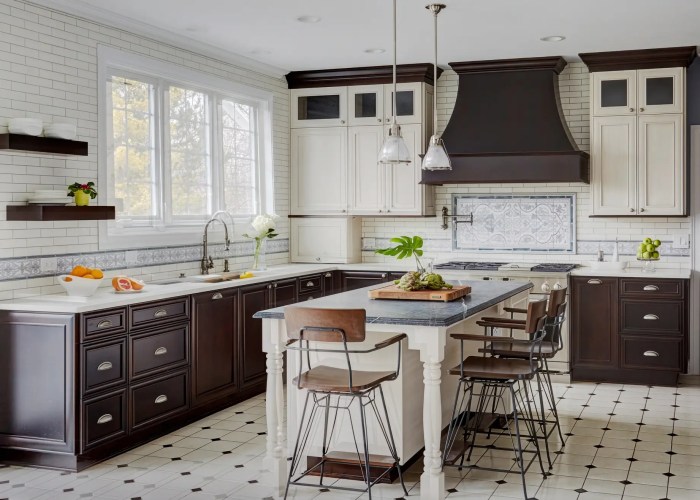
Modular kitchens offer numerous environmental advantages over traditional kitchens. Their design emphasizes sustainability, reducing waste, promoting energy efficiency, and providing flexibility for future changes.
Modular kitchens are manufactured off-site in controlled factory environments, minimizing waste and ensuring precision in construction. The pre-fabricated units are designed to fit together seamlessly, reducing the need for on-site cutting and adjustments, which can generate significant amounts of waste.
Additionally, modular kitchens often utilize sustainable materials, such as recycled wood, bamboo, and low-VOC finishes, further reducing their environmental impact.
Energy Efficiency
Modular kitchens are designed with energy efficiency in mind. The pre-assembled units provide better insulation, reducing heat loss and energy consumption. Energy-efficient appliances and lighting can be easily integrated into modular kitchens, further enhancing their sustainability.
Flexibility
Modular kitchens offer unmatched flexibility, allowing homeowners to adapt their kitchen to changing needs and preferences. The individual units can be reconfigured or replaced as desired, minimizing the need for major renovations or replacements. This flexibility reduces waste and allows homeowners to update their kitchen without sacrificing sustainability.
For example, a homeowner who initially installs a smaller kitchen can easily add additional units in the future to accommodate a growing family or changing lifestyle. This flexibility extends the lifespan of the kitchen, reducing the need for complete replacements and minimizing waste.
Case Studies and Examples
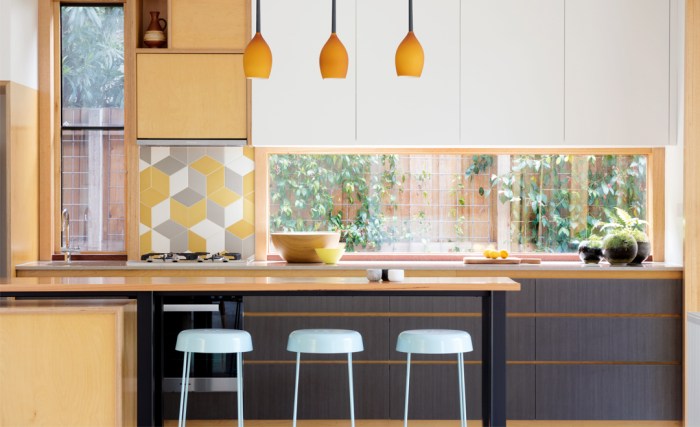
Real-world examples of eco-friendly modular kitchens demonstrate the feasibility and impact of sustainable design practices.
These case studies provide valuable insights into the materials used, challenges faced, and environmental benefits achieved.
Project A
Project Details:A residential kitchen in California, USA, designed with a focus on sustainability and energy efficiency.
Materials Used:Cabinets made from recycled bamboo, countertops from reclaimed wood, and low-VOC paints and finishes.
Environmental Impact:Reduced carbon footprint by using renewable materials, diverted waste from landfills, and improved indoor air quality.
Challenges:Sourcing eco-friendly materials within budget and finding skilled contractors familiar with sustainable practices.
Project B
Project Details:A commercial kitchen in a restaurant in London, UK, aiming to reduce its environmental footprint.
Materials Used:Modular cabinets made from aluminum, recycled glass countertops, and energy-efficient appliances.
Environmental Impact:Significant reduction in water and energy consumption, as well as reduced waste generation.
Challenges:Integrating sustainable design elements into a high-volume commercial kitchen environment.
Project C
Project Details:A community kitchen in a low-income neighborhood in India, designed to provide access to healthy and affordable food.
Materials Used:Cabinets made from locally sourced bamboo, countertops from recycled plastic, and solar panels for energy.
Environmental Impact:Improved access to nutritious food, reduced carbon emissions, and created job opportunities in the community.
Challenges:Limited funding and access to skilled labor, as well as cultural barriers to adopting new cooking practices.
Future Trends and Innovations

The future of eco-friendly materials and sustainable modular kitchen design is bright, with emerging trends and innovations shaping the industry towards greater environmental responsibility and enhanced functionality.
One significant trend is the increasing use of bio-based materials, such as bamboo, cork, and recycled wood, which offer eco-friendly alternatives to traditional materials. These materials are renewable, biodegradable, and have a lower carbon footprint.
Advanced Manufacturing Techniques
Advanced manufacturing techniques, such as 3D printing and CNC (Computer Numerical Control) machining, are revolutionizing the production of modular kitchens. These techniques allow for precise cutting and shaping of materials, reducing waste and enabling the creation of complex designs.
Additionally, the use of digital design tools and virtual reality (VR) allows designers to visualize and optimize kitchen layouts before production, further reducing material waste and ensuring optimal functionality.
Integrated Smart Technology
Smart technology is becoming increasingly integrated into modular kitchens, offering enhanced convenience and sustainability. Smart appliances, such as refrigerators with temperature control and dishwashers with water-saving features, help reduce energy consumption and water usage.
Furthermore, voice-activated controls and automated lighting systems provide hands-free operation and reduce energy waste.
Closed-Loop Systems, Eco-Friendly Materials for Sustainable Modular Kitchens
Closed-loop systems are gaining traction in the kitchen industry, aiming to minimize waste and promote circularity. These systems involve recycling and reusing materials from old or damaged kitchens, reducing the need for raw material extraction and landfill disposal.
By adopting these emerging trends and innovations, the future of eco-friendly materials and sustainable modular kitchen design holds great promise for creating environmentally responsible and highly functional kitchen spaces.
Closing Notes
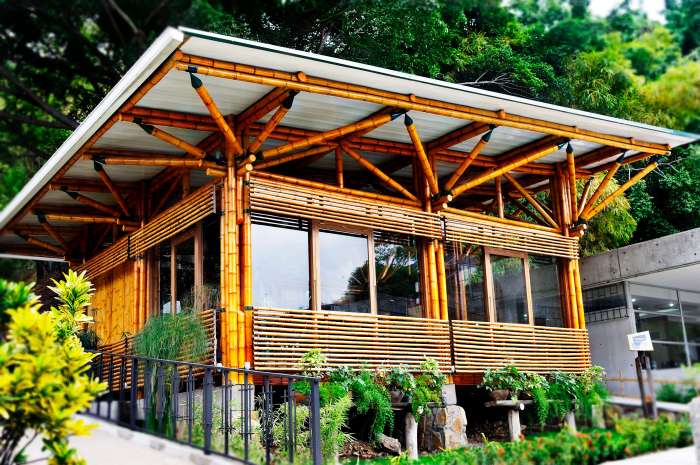
As we embrace the future of sustainable modular kitchens, eco-friendly materials stand as beacons of innovation and environmental responsibility. Their adoption empowers homeowners to create spaces that not only enhance their daily lives but also contribute to a greener planet.
The journey towards sustainable living continues, and these materials pave the way for a harmonious coexistence between style and sustainability.
FAQ Guide: Eco-Friendly Materials For Sustainable Modular Kitchens
What are the key benefits of using eco-friendly materials in modular kitchens?
Eco-friendly materials reduce environmental impact, promote resource efficiency, and enhance indoor air quality.
How do modular kitchens contribute to sustainability?
Modular kitchens minimize waste, promote energy efficiency, and offer flexibility for future modifications.
What are some examples of eco-friendly materials used in modular kitchens?
Examples include bamboo, recycled glass, low-VOC paints, and sustainably sourced wood.
